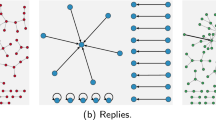Abstract
The analysis of Online Social Networks (OSNs) data is an emerging field involving sociology, statistics, and graph theory. Regression Discontinuity Design (RDD) is a quasi-experimental research design widely used in social, behavioral and related sciences. In this paper, we proposed a methodology to analyze the data from the most popular micro-blogging OSN ‘Twitter’. The methodology is implemented using ‘R’ statistical tool. The tweets related to the ‘Mangalayan’ event, India’s Mars Orbiter Mission launched on 5 November 2013 by the Indian Space Research Organization are analyzed. The Twitter users who are expressive/non expressive on this event are examined. In particular the pattern related to the user’s responses to this event is identified, which helps in predicting the Twitter users’ social behavior and their involvement associated to such similar events. The most frequent words reflecting the relevance to this event are visualized. The visual results are helpful to understand the pattern or trend of tweets generated by the Twitter users. The users and their tweets in the study are analyzed as two groups based on the word frequency and their relevance to the event. This helps in analyzing the discontinuity pattern in the tweets and exploits the inherent randomness that exists in the frequency of word occurrence using RDD. It is realized from the experimental study that the RDD estimates and plots are credible to analyze the data from the Twitter OSN. Further, it will help the research community to explore the dynamic behavior of the Twitter users adopting this methodology.
Access this chapter
Tax calculation will be finalised at checkout
Purchases are for personal use only
Similar content being viewed by others
References
Barbera, P.: Access to Twitter Streaming API via R, version 0.2.1, CRAN repository (2014)
Braden, J.P., Bryant, T.J.: Regression discontinuity designs: applications for school psychology. School Psychol. Rev. 19(2), 232–239 (1990)
Borgatti, S.P., Mehra, A., Brass, D.J., Labianca, G.: Network analysis in the social sciences. Science 323(5916), 892–895 (2009)
Couture-Beil, A.: Package ‘rJson’, version 0.2.15, CRAN repository (2015)
Domizi, D.: Microblogging to foster connections and community in a weekly graduate seminar course. J. TechTrends 57(1), 43–51 (2013)
Dutky, S., Maechler, M., Dutky, S.: Package ‘bitops’, version 1.0-6, CRAN repository (2016)
Easley, D., Kleinberg, J.: Overview, Networks, Crowds, and Markets: Reasoning About a Highly Connected World, pp. 1–20. Cambridge University Press, New York (2010)
Freeman, L.: The Development of Social Network Analysis: A Study in the Sociology of Science. Empirical Press, Vancouver (2004)
Gentry, J.: R Interface For OAuth, version 0.9.6. CRAN repository (2015)
Goodchild, M.: Crowdsourcing geographic information for disaster response: a research frontier. Int. J. Digit. Earth 3(3), 231–241 (2010)
Hyunshik, L., Tom, M.: Using regression discontinuity design for regression evaluation. JSM (2008)
Kumar, S., Morstatter, F., Liu, H.: Twitter Data Analytics. Springer, New York (2013). https://doi.org/10.1007/978-1-4614-9372-3
Lang, D.T.: General Network (HTTP/FTP/…) Client Interface for R. version 1.95-4.8. CRAN repository (2016)
Luyten, H.: An empirical assessment of the absolute effect of schooling: regression discontinuity applied to TIMSS-95. Oxford Rev. Educ. 32(3), 397–429 (2006)
Richard, S.W., Davis, D.F.: Networks In and Around Organizations. Organizations and Organizing. Pearson Prentice Hall, Upper Saddle River (2003)
Sailaja, K., Evangelin, G., Suresh Kumar, T.V.: Prediction of events in education institutions using online social networks. In: Circuits, Communication, Control and Computing (I4C) (2014)
Sebastian, C.: Package rdrobust. CRAN repository (2016)
Stanley, W., Katherine, F.: Social Network Analysis in the Social and Behavioral Sciences. Social Network Analysis: Methods and Applications, pp. 1–27. Cambridge University Press, Cambridge (1994)
Author information
Authors and Affiliations
Corresponding author
Editor information
Editors and Affiliations
Rights and permissions
Copyright information
© 2019 Springer Nature Singapore Pte Ltd.
About this paper
Cite this paper
Sailaja Kumar, K., Evangelin Geetha, D., Suresh Kumar, T.V. (2019). A Study on Discontinuity Pattern in Online Social Networks Data Using Regression Discontinuity Design. In: Akoglu, L., Ferrara, E., Deivamani, M., Baeza-Yates, R., Yogesh, P. (eds) Advances in Data Science. ICIIT 2018. Communications in Computer and Information Science, vol 941. Springer, Singapore. https://doi.org/10.1007/978-981-13-3582-2_11
Download citation
DOI: https://doi.org/10.1007/978-981-13-3582-2_11
Published:
Publisher Name: Springer, Singapore
Print ISBN: 978-981-13-3581-5
Online ISBN: 978-981-13-3582-2
eBook Packages: Computer ScienceComputer Science (R0)




